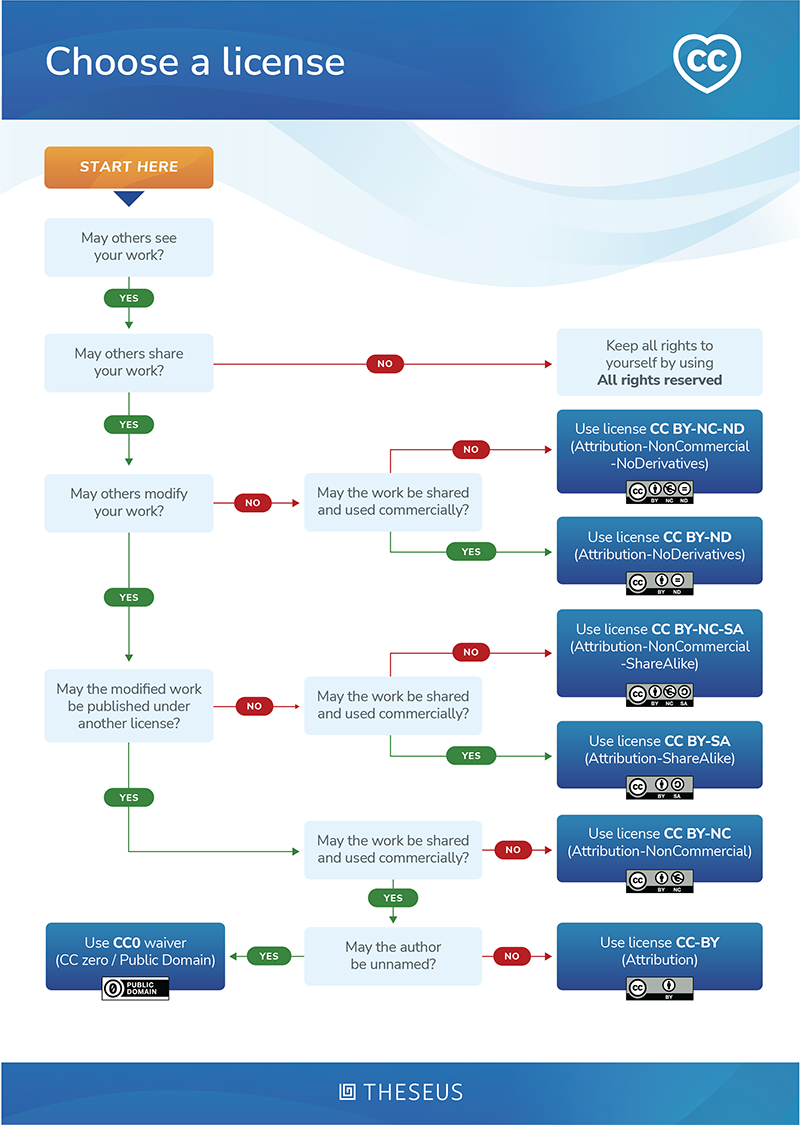
In Finland, the Ministry of Education is responsible for matters related to copyright. The web pages of the Ministry of Education contain extensive information on copyright and the links to the web pages of the copyright organisations that monitor the rights of copyright holders. The Data Protection Ombudsman, in turn, guides, gives advice on data security and monitors the treatment of personal data. Furthermore, the Ombudsman also follows the general flow of personal data treatment and takes care of the information services belonging to his/her sphere of authority and the international cooperation on the issue of personal data treatment.
The student must always be asked for permission to publish the thesis online and can always refuse to grant it without having to state the reason. When entering his/her thesis into the system, the student must accept the terms of use of Trepo/Theseus in order to continue the process. By accepting the terms of use, the student gives gratuitous permission to Tampere University/Tampere University of Applied Sciences to publish the thesis in the electronic library and declares that all copyright matters are in order.
The student is also offered the possibility to use Creative Commons licensing to share the thesis online. Creative Commons is a gratuitous licensing system directed to authors and right holders that helps them express their will in relation to the terms and conditions for making digital works available to the public and other authors. Creative Commons offers an online service by means of which the right holders can inlcude a description of the rights related to their work when publishing their work online. With the Creative Commons licence, the right holder can surrender, in a controlled way, part of the rights originally granted by the legislation on copyright. The system clarifies the uncertainty related to the rights of users and copyright holders.
Creative Commons is a licensing system that enables the authors to set, in a simple way, the rules on the use of their work, especially in an electronic environment. The system also includes the "Commons deed" summaries, which present the main points of the licences. There is no need to be a lawyer to read these summaries. In fact, simple logos are used in them in order to make them easier to use for authors and other users. Creative Commons provides the licences also in a machine-readable form.
Creative Commons operates to the advantage of authors and users. Creative Commons gives the authors more possibilities to exert their right to control the works that are distributed on the Internet. The licensing system creates a legal alternative to the pirate market as the distribution of the works is carried out according to the right holders' wish.
Using a CC licence does not mean giving up your copyright, but it allows you to make your material available to others under certain conditions. You can select a Creative Commons licence when you own all rights to your thesis or you have permission from the owners of parallel copyrights to use the licence. With a Creative Commons licence, you can inform other users of what they are allowed to do with your work. You can, for example, allow them to copy, share, display or present your thesis or modified versions of it and to obligate them to reference your name as the original author. The terms of use depend on the licence you choose.
The Creative Commons licensing system contains different features which, when combined, create seven different licences. Use the Creative Commons licence Choose to choose a licence, or the image below to illustrate.
The figure below illustrates the choice of combinations of different terms of the CC licence and the impact on the further use of CC-licensed material.

Picture: Petra Boije CC BY-SA 4.0
Text on this page is based on Theseus - Instructions for uploading a thesis.